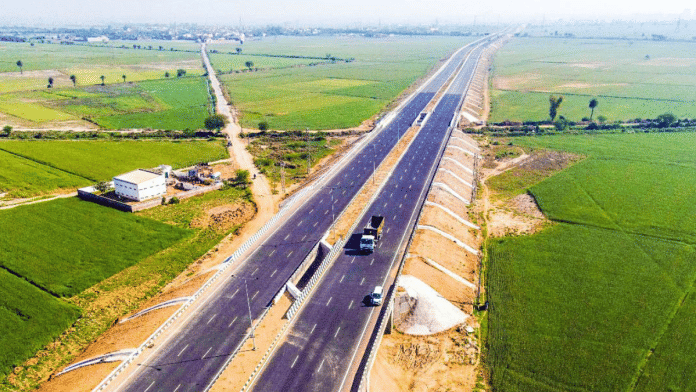New Delhi: Flagging several irregularities in the preparation of Detailed Project Reports and functioning of project consultants in the Bharatmala Pariyojana and other expressway and national highway projects, a parliamentary panel has recommended that the road transport and highways ministry review the current process of engaging them and consider conducting an audit of past awarded work of the project consultants by the Comptroller and Auditor General (CAG) to ensure greater accountability in the implementation of projects.
Bharatmala Pariyojana, an umbrella programme launched by the central government in 2017 to develop 74,942 km of national highways, has overrun its costs and is well past its completion deadline.
Of the 34,800 km of national highways approved under Bharatmala Phase I, which was estimated to cost Rs 5.35 lakh crore, work on only 26,425 km has, so far, been awarded.
Of the 26,425 km, work on only 18,180 km has been completed at a cost of approximately Rs 5 lakh crore, nearly equal to the total project cost. The work on the remaining 8,000 km under Phase I was shelved.
“The committee expresses dissatisfaction with how the 32 project consultants have been preparing DPRs without adequate consultation with local stakeholders, including practical experts and local representatives, particularly Members of Parliament,” the House panel said.
The panel, headed by Sanjay Kumar Jha, the Rajya Sabha MP from National Democratic Alliance ally Janata Dal (United), tabled the report, Demands for Grants (2025-26) of the Ministry of Road Transport and Highways, in the Rajya Sabha Tuesday.
Bharatmala Phase 2 has already been scrapped
The original deadline to complete work on 34,800 km of national highways, approved under Phase I of the Bharatmala programme was September 2022. However, senior road ministry officials had told ThePrint that not only had the deadline passed, but the overall project cost had also escalated to roughly Rs 10 lakh crore.
The government, meanwhile, decided to scrap Bharatmala Phase 2, which involved developing 40,000 km more of national highways after a 2023 CAG report flagged glaring irregularities in the Phase 1 implementation. The irregularities included projects developed “based on deficient cost-benefit study or without getting detailed project reports prepared”.
“Detailed project reports prepared by consultants were not appraised with due diligence by the competent authority before approval of projects,” the 2023 CAG report said.
The report also highlighted the deficiencies in the appraisal and approval mechanism, which the Cabinet Committee on Economic Affairs (CCEA) was supposed to undertake.
Many of the high-cost Engineering, Procurement and Construction (EPC) contracts under which the government provides 100 percent of the funds—for instance, the Delhi-Vadodara Expressway and Dwarka Expressway—did not even have the advantage of a CCEA or Ministry of Road Transport and Highways of India assessment, according to the report.
“Further, even the appraisal and approval mechanism decided by CCEA was also not strictly followed,” the CAG said in its 2023 report.
Under existing norms, any project whose cost exceeds Rs 1,000 crore needs Cabinet approval. Smaller projects costing under Rs 1,000 crore do not require a Cabinet nod, with the ministry approval considered sufficient in such cases.
(Edited by Madhurita Goswami)
Also Read: India-Myanmar-Thailand highway — final piece of the puzzle in New Delhi’s Atlantic to Pacific push






